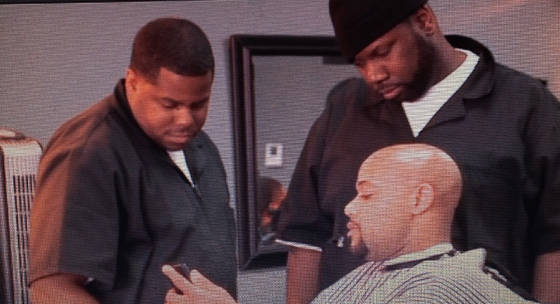BatonRougeAIDSSociety.org
IN THE NEWS
|
|
|
Click on Picture Below To View Channel 33 News Report on Mentoring:
BR AIDS advocates ask barber shops for help pairing kids with mentors David
Lippman Reporter POSTED: Wednesday,
January 22, 2014 - 5:00am UPDATED: Wednesday, January 22, 2014 - 8:54pm Baton Rouge, LA (NBC33) — A visit to the barbershop or hair salon can make someone look a little better, but it can also transform a young
person's life. That's because they have started partnering with a local non-profit
for a city-wide mentoring drive. "[Barber
shops] stand for the community, we are the community," said Michael Thomas of Uppercuts Barber Shop. This is the place you come when you have problems, or issues, or whatever the case may be. "So when the Baton Rouge AIDS Society (BRASS) decided to make mentoring its issue, it reached out to barber shops and salons, where cutting is often less
important than chatting. "Barber shops and beauty salons, they're the portals to
the community because everybody's coming out here," mentioned BRASS CEO A.J. Johnson. "And the discussions that
take place in the barber shops, and in the beauty salons, it's about real life. So what better way to talk about the problems
in school, the problems with crime, the problems with drugs, the problems with teen pregnancy, and all these issues, than
to have Baton Rouge AIDS Society come out and say, 'look, it's not about just HIV testing, it's about how can we get our young
people to grow up without having these problems any more?' "When Johnson first called Thomas, he had no hesitation about
getting involved. "Me personally, anything that's dealing with the community,
I don't care what it is," Thomas said. "As long as it's something good, then I'm all for it. "But the idea of turning clients into mentors
and mentees held a personal significance. Growing up, he relied on, "just the older guys from the neighborhood. That's
who really inspired me, that's who really took me under their wings and made sure I did good, made good grades in school and
made I did all right in sports. "My barber
pretty much stayed on my behind about my grades and stuff," he added. "And I kinda took that and brought that in
the (Uppercuts) barber shop. "So he lets BRASS set up a table with informational pamphlets, and Johnson and other BRASS leaders talk to customers
young and old about the value of mentoring. Many of them sign up for one-year commitments. "Actually, it's been surprising, it's been pretty cool," Thomas said of his clients'
response. "A lot of the young people been coming up and shocking me. And especially the older people who want to be mentors.
I was pretty shocked. But it's pretty good." "We talk
to clients while they're waiting," Johnson stated. "We were talking to one lady while she was under the drier. This
is the most successful event we've had, as far as reaching the community." January is National Mentoring Month. BRASS is one of three local non-profits leading mentorship drives on behalf of the state Office of Juvenile Justice. Each has been tasked with pairing 75 mentors with children. That may not seem like a large number, but Thomas
knows every mentor is important. "I think it'll make a big difference,"
he claimed, "because somebody cares. And that's really the main thing. A lot of these cats think that don't nobody care
about them, but (they learn they're wrong) for the simple fact they come in the barber shop and they think we're cool, they
think we make all this money, or whatever, and we actually care about them." Children must be between the ages of 11-15. Mentors must be 21 years or older. They must have
a valid driver's license and proof of insurance, must pass a background check, and must commit to at least eight hours a month
for a year. If they do, OJJ will train them to be mentors. "Our mentors are trained to go to school with the child, to talk to principals with the child, to help the parents
with homework situations," Johnson said. "And if they have other needs like clothing or food, or stuff that might
not be in the scope of the mentor, how can the mentor help to link the parent to these services in the community." Some people may feel they do not have enough life experience
or the right career to be good mentors, but Johnson refuted that notion. "If you're a college student, that's a great mentor," he noted. "Because the conversations that you
have about college can inspire that child to go to college." If you want to learn more about becoming a mentor, call BRASS at 225-923-AIDS (2437). |


